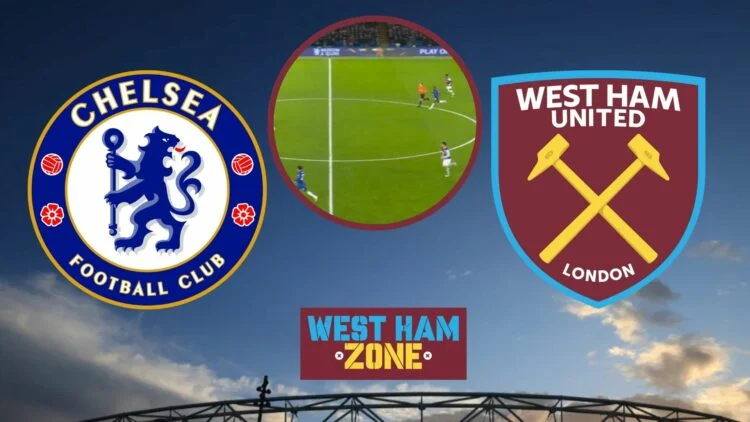This latest controversy involving Chelsea’s 2-1 win over West Ham United has once again put Premier League officiating under the spotlight. Former PGMOL chief Keith Hackett has expressed his disbelief that Chelsea’s equaliser was allowed to stand, despite what appeared to be a clear foul by Levi Colwill on Jarrod Bowen in the build-up. The incident has sparked significant frustration among West Ham fans and raised further concerns about the consistency and effectiveness of VAR in English football.
The Controversial Goal
West Ham had taken the lead through Jarrod Bowen, marking his return from injury with a goal that put the Hammers in control of the match at Stamford Bridge. However, the turning point of the game came when Pedro Neto found the net for Chelsea in what West Ham felt was a highly contentious equaliser.
The main issue revolves around Colwill’s challenge on Bowen, which many—including Hackett—believe should have been penalised immediately. The Chelsea defender appeared to make clear contact with Bowen, but referee Stuart Atwell did not blow for a foul, allowing play to continue. VAR then checked for two possible infractions: the foul itself and a potential offside involving Marc Cucurella. Despite reviewing the footage, the goal was given, much to the frustration of West Ham players, coaching staff, and fans.
Keith Hackett’s Reaction
Hackett, a highly experienced former referee and ex-head of PGMOL, was baffled by the decision. Speaking to West Ham Zone, he stated:
“I am amazed that the foul on West Ham’s Bowen was not penalised immediately. The referee was wrong to allow the game to progress, which resulted in Chelsea scoring. The goal should have been ruled out.”
His comments highlight the growing dissatisfaction with the standard of refereeing in the Premier League. If a former top official sees the decision as a clear mistake, it raises serious questions about why neither Atwell nor the VAR officials saw fit to overturn it.
Impact on the Game and West Ham’s Frustration
With West Ham leading at the time, the controversial equaliser proved to be a pivotal moment. Before that goal, David Moyes’ side looked well-positioned to at least take a point from the match, if not secure a victory. However, the decision to let the goal stand shifted the momentum in Chelsea’s favour.
Not long after, West Ham suffered further misfortune when Aaron Wan-Bissaka scored an own goal, ultimately sealing the win for Chelsea. Given the controversial nature of the equaliser, it’s understandable why West Ham feel aggrieved, as they might have left Stamford Bridge with a completely different result if the decision had gone their way.
The Bigger Issue – Premier League Officiating and VAR
This incident is just the latest in a long list of questionable refereeing decisions in the Premier League this season. Time and time again, VAR has been criticised for failing to step in when clear and obvious mistakes are made. While the technology was introduced to eliminate such errors, it has often added more confusion, with inconsistent rulings frustrating players, managers, and fans alike.
West Ham will certainly feel that they were robbed of at least a point, but the wider debate about refereeing standards in the Premier League continues. If top referees are consistently making mistakes—whether on the pitch or in the VAR room—then serious questions need to be asked about the training and accountability of officials.
What Next for West Ham?
The Hammers will have to move on quickly from this disappointment, but it will no doubt leave a bitter taste. With every point crucial in the Premier League, losing a match due to what they perceive as poor officiating could have long-term consequences for their season.
David Moyes and his squad will now focus on their next fixtures, but the frustration from this match will likely linger. Meanwhile, the Premier League and the PGMOL must once again face scrutiny over the standard of refereeing and the way VAR is being implemented.
Do you think VAR is improving the game, or is it making it worse with inconsistent decisions like this?
